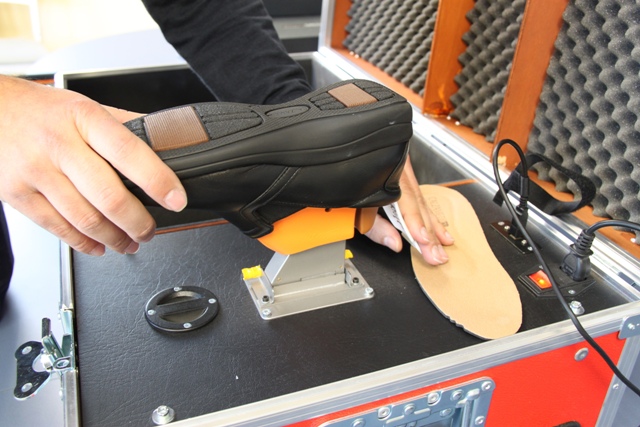May 26 2015
 InstantShoe. Credit: Biomechanics Institute of Valencia
InstantShoe. Credit: Biomechanics Institute of Valencia
A consortium of EU-funded project Demo ShopInstantShoe has developed a novel modifiable female shoe using a unique memory shape composite consisting of Nitinol material and leather. The team involved in the project illustrated the results at Calzamedi’s installations in Villena, Spain.
Six European partners participated in Demo ShopInstantShoe: two from Spain, Biomechanics Institute of Valencia (IBV) and Calzamedi, two from France, Texinov (Lyon) and Nimesis (Strasbourg) one from Switzerland, Technoboots, and one from Portugal Ortopedias Twins.
Anthropometric measurements were obtained using a Shopintantshoe portable scanner. Then the new composite material is adjusted using a machine called “Shoptool”, which is capable of finishing the process within the shop itself. The material then enables the shoe to be fitted to the foot shape. The unique compact InstantShop tool is lightweight and can be smoothly assembled in the shoe shop for immediate customization.
InstantShoe comprises the shaping system, smart configuration software, an innovatively designed machine built-in with three different lasts for every size range, and the foot scanner DOME, constructed by the Biomechanics Institute of Valencia.
As Juan Carlos González, Innovation Director of Footwear and Clothing Area at IBV, explained: “The service consists of an innovative customisation process that takes place directly in the retail store and allows scanning clients' feet in order to obtain basic anthropometric measures and adjusting the chosen shoes immediately through the Shoptool. This is possible thanks to the new memory shape composite material made of leather and Nitinol.”
Mr. González added, “Anyone will be able to get the best fit, and if finally the client does not wish to buy the product, the shoe will recover the original shape by warming it up during few seconds.”
The original memory shape material is useful for designing female shoes which are not only advanced, comfortable, ergonomic, and custom-fit but also fashionable.
The entire shoe making process is conducted within the shop, thereby providing the customer with a relaxed experience minus any embarrassments relating to their foot issues. This will soon be a possibility when the InstantShoe prototype is launched into the market towards the end of 2015.
A large number of women are affected by different types of foot diseases. Bunion or Hallux Valgus is the most common foot deformity affecting 20% of adult women. Other diseases that occur in the forefoot include claw toes, metatarsalgia, hammertoes, and ingrown nails are primarily caused due to improper and prolonged use of ill-fitting footwear. This is because there is a disparity between the footwear and the foot’s morphometry.
Accurate fitting is crucial for footwear performance and comfort; however this is a real challenge as foot sizes and shapes vary tremendously, and cause footwear to be ill-fitting and unhealthy quite often.
In order to provide an edge against competitors, the European footwear sector is trying to identify, comprehend and adapt new practices and also develop new concepts using advanced areas such as materials and composites to capture higher added value applications.
InstantShoe is one such innovation. It can offer customers instant, economical individualized fitting and customization according to specific requests. The DemoShopInstantShoe project received funding from the Seventh Framework Programme of the European Commission. It is a successive project based on the successful 2012 ShopInstantShoe project.
The latest DemoShopInstantShoe project aims to create top quality female footwear in a few minutes by a shop assistant. The first two steps of the customization process involves the customer selecting a shoe model from a range of models available and taking the customer’s measurements with the help of images captured and processed through a specific app. The next stage involves using an automatic deformable last, to adjust the upper part of the shoes so that the footwear matches the customer's foot geometry.
The shoes’ upper part comprises a precise shape memory composite for enabling the given shape to be maintained. The customer is given an opportunity to confirm the fitting and make a decision on whether to purchase the footwear or not. In case the footwear is not selected, it is subjected to heat treatment in a customization box so as to help the shoe to gain its shape back. This whole process can be carried out many times on a particular shoe.
The key advantage being that customers with minor foot diseases get to have a broad range of choices than ever before as well as get to try on many samples without having to buy them if they do not suit their likes. The shop assistant can then take the rejected model and place it back in stock. Retail shops also benefit from this as there is no incidence on the stocks level.
The recovery procedure is possible due to the properties of the shape memory material in the shoes’ upper part. During gluing process, the innovative material is placed between the shoe’s inner lining and outer leather.
This provides the composite structure with the shape memory effect. The critical part in the shape-memory-providing-composite material is wires made from Nitinol, an alloy of Nickel and Titanium, which possesses shape memory property. These wires are inserted into the material in a specific patented pattern.
As metallic filaments are very different from textile yarns due to their extremely high stiffness, they cannot be used in a conventional knitting process. Therefore, machinery would be required to operate the loom with these Nitinol wires.